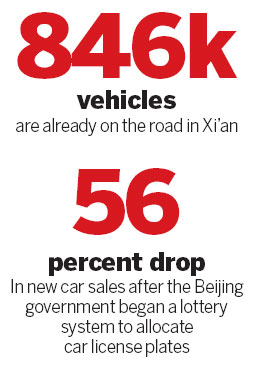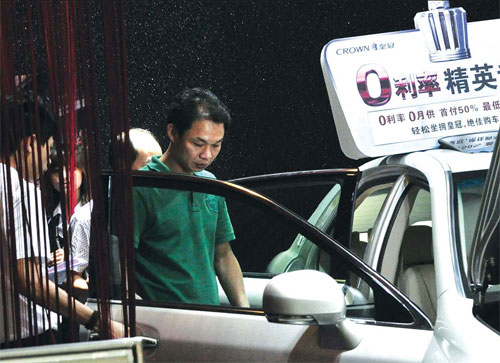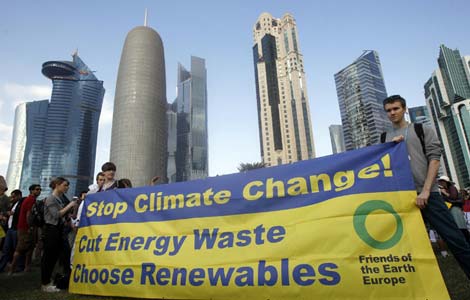Xi'an hits reverse on car restriction
Updated: 2012-08-13 08:04
By Han Tianyang and Gong Zhengzheng (China Daily)
|
|||||||||||
|
A hopeful buyer in Guangzhou is among those vying for 120,000 plates that will be issued by the metropolis this year. A similar plan by Xi'an has been put on hold. [Photo provided to China Daily] |
Rescinds 1-millon limit following public outcry
In a move that reflects the myriad challenges facing the world's biggest auto market, the government of Xi'an last week rescinded a plan to limit new car license plates following a strong public outcry.
The decision followed an Aug 1 announcement that the number of motor vehicles in the city would be limited and the government would hold a hearing to consider public opinions.
An expert panel organized by the Xi'an city government previously said the city should limit private car ownership to under 1 million vehicles before 2015 to solve traffic congestion problems.
According to local statistics, the number had already surpassed 846,000 in May and is on track to easily break the 1-million threshold over the next two years.
The Xi'an announcements came only a month after the Guangzhou metropolitan government implemented a highly controversial policy to restrict the number of new car license plates each year to just 120,000.
Guangzhou became the fourth city in China to place limits on new plates following Beijing, Shanghai and Guiyang in Guizhou province.
But the Xi'an plan stirred strong public complaints, especially on the Internet. Facing the pressure, the city government decided to halt the initiative.
More cities to follow
Experts note that it is only a question of time before more cities take measures to control the number of cars as they deal with increasing traffic and pollution problems.
Zhang Xin, an auto analyst with Guotai Jun'an Securities, said Shenzhen, Hangzhou, Nanjing, Qingdao and Dalian are all mulling similar restrictions on car purchases.
Zhong Shi, an independent auto analyst based in Beijing, said it will be a trend for major cities that suffer severe traffic problems to limit car purchases. He said the restrictions will surely affect the auto market since cities with more traffic congestion are usually those with strong purchasing power.
Guangzhou's new car sales are expected to decline significantly under the new policy. Last year, the city registered 330,000 new vehicles, nearly three times the quota under its new regulations.
After Beijing's sales cap took effect in December 2010, new car sales in 2011 tumbled by 56 percent to about 400,000 vehicles. In comparison, more than 700,000 vehicles were sold in the city in 2009 and the number was nearly 900,000 in 2010.

Analysts also warned that the trend will hit domestic carmakers particularly hard. Their main products are small, inexpensive vehicles that target mostly first-time buyers, exactly the most affected group by the license plate restrictions, they said.
"Consumer psychology changes because it's more difficult to get a car license plate," Zhong said. "Thinking that it's once and for all will make them choose more expensive vehicles with bigger engine displacement instead of cheap and small ones."
"What we learned from Shanghai and Beijing tells us that - whether through lottery or public auction - such policies influence consumers to buy more expensive, bigger cars and foreign-branded cars," said Dong Yang, secretary-general of the China Association of Automobile Manufacturers, who strongly disagreed with the local governments' measures to curb sales.
Domestic brands
In the first half of 2012, domestic brands sold 3.15 million passenger vehicles including minivans, a decrease of 0.2 percent from a year earlier, while the overall passenger vehicle market grew 7.1 percent, according to statistics from CAAM.
The market share of domestic passenger vehicles declined 3 percentage points to 41.4 percent in the first half. German and Japanese brands both reported increases of more than 1 percentage point in market share, the association said.
"But it won't be a fatal blow to domestic carmakers," said Lin Huaibin, an auto analyst with consultancy IHS Automotive. "They still have opportunities in many medium and small cities."
Zhang with Guotai Jun'an added that the fundamental problem with license plate restrictions is that infrastructure can't keep pace with the increasing number of cars.
Yet limiting in car purchasing is a half-measure, some analysts noted, calling for the local governments to improve both public transport and city planning to limit congestion and pollution.
Contact the writers at [email protected] and [email protected]











